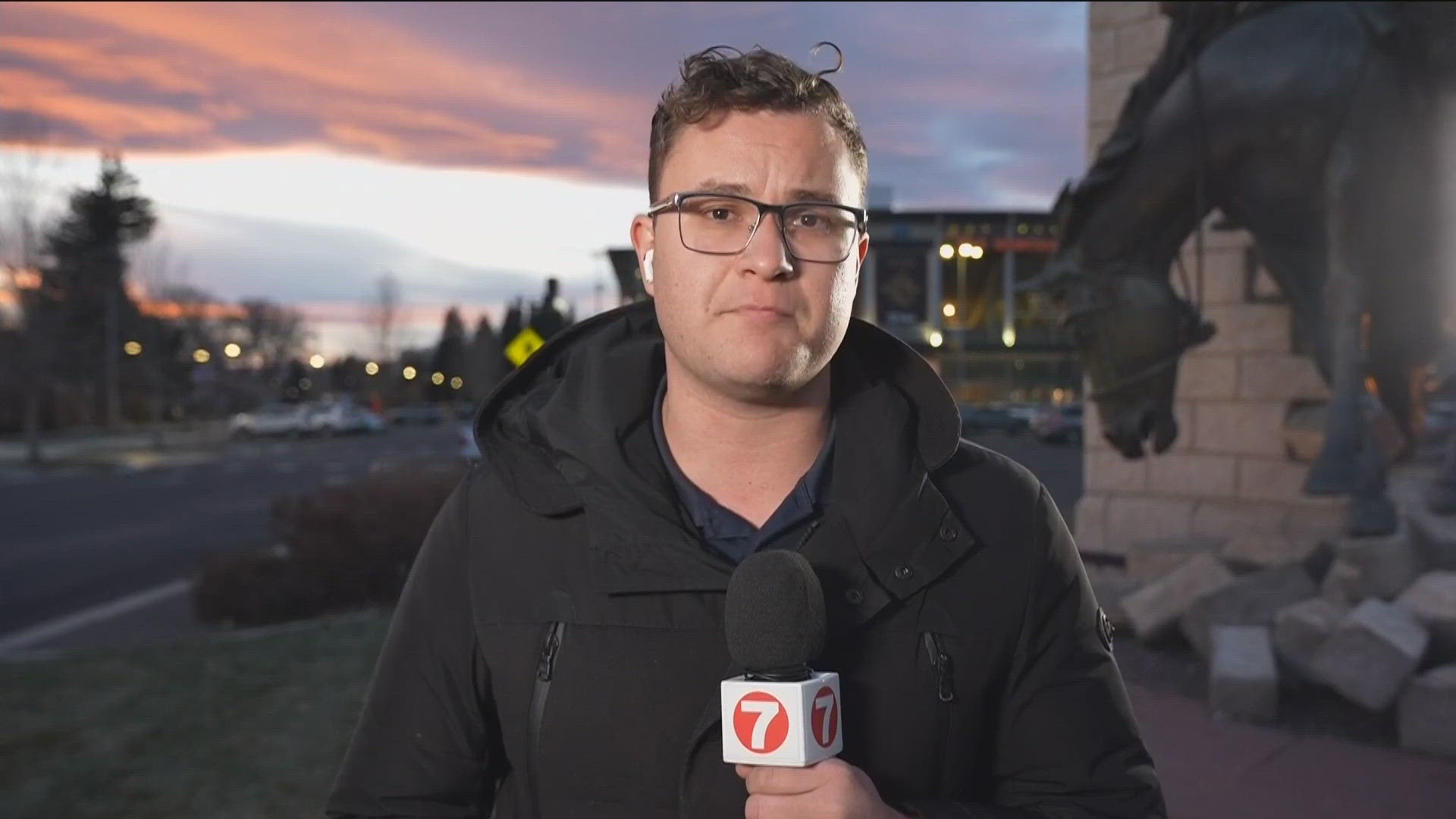NAMPA, Idaho — (Note: at the time of publication, the videos referred to in this story have been taken down from Facebook.)
A Nampa woman has filed a complaint with the Canyon County Sheriff's Office after she and her daughter were blocked in by a homeowner and questioned by deputies on suspicion of trespassing while conducting interviews for the Census Bureau, according to the Idaho Press.
Maria Boutte filmed the encounter on her phone on July 27, when she and her 18-year-old daughter, Samantha, were driving and searching for a rural Canyon County address so Samantha could conduct an interview for her job as a census worker.
The pair turned the car down a driveway in the 2500 block of Happy Valley Road in Canyon County. Two vehicles driven by two women — the homeowner and a neighbor — drove in behind them and refused to let them leave for half-hour.
Both Maria Boutte, who felt unsafe because she was blocked in, and one of the other women called the police. The homeowner told police she thought the Bouttes were acting suspiciously and could be trespassing, though the Bouttes’ car had a U.S. Census Bureau sign and Samantha showed them her U.S. Census Bureau identification.
When Canyon County Sheriff's deputies arrived, they appeared to treat the Bouttes differently than the other two women, according to Maria Boutte's recordings of the encounter.
Maria Boutte said race seemed to be a factor in how she and her daughter were treated. The Bouttes are Latina, with the other women involved appear to be white.
The Bouttes, after explaining to deputies they were there for a census interview and showing them physical identification, had to wait another 30 minutes before deputies cleared the driveway so they could leave.
"As in all investigations, the deputies took the appropriate amount of time they felt necessary to obtain pertinent information from all parties," Canyon County spokesman Joe Decker told the Idaho Press over email. "There were also multiple allegations that needed to be investigated."
Maria Boutte said she felt the deputies took the word of the other women at face value while constantly questioning hers. Deputies asked for the Bouttes' physical IDs, but not for the other women's.
Decker confirmed the deputies only asked the other women for "verbal verification" of their identification; their names have not been released. The deputies verified ownership of the property through dispatch, he said.
Maria is heard multiple times saying she feels unsafe. She assures Samantha, who was crying, that she won't let anything happen to her.
At one point in Maria Boutte's recording, an officer tells her the other women were concerned “because they get a lot of burglaries here.” At another point, a deputy asks Maria why she’s in “such a hurry” to leave. Later, an officer asks Maria if she’s familiar with Idaho’s trespassing law.
The deputies, after seeing the Bouttes' IDs, are seen in the video standing with the other women outside their vehicles, laughing and talking out of earshot. Maria Boutte calls out to the officers, trying to find out why she isn’t allowed to leave and why they haven’t had the women move their vehicles.
“In a minute,” one of the deputies calls back. “We’ll be with you in a minute.”
Maria Boutte later told the Idaho Press, “I feel like they catered totally to them and it was like, 'Why is that?'”
She filed a complaint against the deputies with the sheriff’s office, and a lieutenant called her two days after the incident. The lieutenant said the deputies had acted respectfully, Boutte said.
"(The sheriff's office) is reviewing the incident based on the complaint filed," he said. "Actions of the deputies are being evaluated to determine if they were within policy and the norms of law enforcement. It does not appear the deputies acted outside of either of those parameters."
Decker confirmed on Wednesday that deputies have forwarded their investigation of the incident to the Canyon County Prosecutor’s Office; as of Wednesday, no decision had been made on charging.
Samantha Boutte has since quit her census job. The money was good for a teenager, but she didn’t feel safe after the July 27 incident, her mother said.
The U.S. Census Bureau notifies local law enforcement when census workers will be going door to door, according to a statement provided to the Idaho Press. The bureau has started doing in-person follow-up to houses across Idaho and asks homeowners to cooperate with census takers.
'IT WENT TO THE NEXT LEVEL'
Maria Boutte’s videos sparked outcry when she posted them on social media. People called the deputies’ conduct condescending and voiced their frustration with how the Bouttes were treated.
At its core, though, the incident never required a police response in the first place, said Brian Dunn, a Los Angeles civil rights attorney with more than 25 years of experience. He watched the videos Maria Boutte posted.
The question the community should ask itself after viewing the video, Dunn said, is "why this woman … felt like she was doing the right thing by stopping these women from leaving."
“She just assumed they were there for the wrong reasons, and they weren’t,” Dunn said.
He pointed out the dispatcher who took the call from the woman could have tried to talk the woman into simply letting the Bouttes leave, since they didn’t appear to pose a threat to public safety. In bigger cities where police are busier, dispatchers often act as gatekeepers for calls.
Dunn said the deputy was correct when he told Maria Boutte he had to conduct an investigation of the incident. The officer had just arrived and didn’t know what was going on. But the situation could have been resolved more quickly, he said. He said, from watching the video, he believed the deputy took it personally when Maria Boutte questioned his approach.
“The reality is, the only thing that (the deputy) was there to find out was: A) Was a crime being committed? And … were these particular individuals having involvement in the crime?” Dunn said. “And the crime that he’s investigating is the crime of trespassing. And they did not commit that crime because they had a right to be there. End of story. It went to the next level because (the deputies) decided, I think, that they were just going to make (the Bouttes) sweat for a while.”
Ayesha Bell Hardaway, an assistant professor at Case Western Reserve University School of Law, who worked on the Cleveland Police Department’s consent decree, also watched Maria Boutte’s videos.
The deputies, she said, missed an opportunity to build a relationship with community members. They didn’t explain their investigation process to Maria Boutte even after she asked and even when she told them she felt unsafe. At one point toward the end of the incident, Bell Hardaway pointed out, one of the deputies even opens Samantha Boutte’s door without permission.
Deputies mischaracterized Idaho’s trespassing law because it allows a census worker to do their job, Bell Hardaway said.
“The conversation around trespassing, to admonish (the Bouttes) … was, I think, unfortunate, off-putting, and it misconstrues” the law, she said.
She said listening to Samantha Boutte cry in the video was difficult.
“To hear the officers … be incredulous about the fact that (the Bouttes) weren’t feeling safe was really hard for me as a mother and a person of color,” she said.
While both Dunn and Bell Hardaway acknowledged the video doesn't capture the deputies' conversation with the other women, they still felt the officers should have treated the Bouttes differently.
'IT IS INTIMIDATING'
Maria Boutte said people have paid attention to her videos on Facebook is because they themselves have felt treated differently by police on the basis of race.
Dunn agreed race is part of the conversation.
"Is there a component of this dialogue that has to with 'us against them?'" he posited.
Margie Gonzalez, executive director of the Idaho Commission on Hispanic Affairs, also watched Boutte's videos, and said she was horrified by what she saw. She said she felt the intimidation coming from the white women and deputies.
“To be held against your will? It is intimidating,” Gonzalez said.
The incident occurred days before a law enforcement training hosted by the commission, aimed at teaching participating departments on cultural competency and cultural awareness. The Canyon County Sheriff’s office did not send any deputies to the training, though Gonzalez personally asked the agency to participate.
“There is training that needs to happen,” Gonzalez said. “It needs to happen around the relationship between law enforcement and communities of color.”
While the deputies spoke to Maria Boutte and her daughter, she repeatedly said she felt intimidated by the deputies; each time she did, the deputies asked her why.
“The law enforcement officers themselves were intimidating her by continuously asking her why she felt intimidated,” Gonzalez said. “Being asked that in itself is intimidating.”
Gonzalez said the videos were evidence to her that more training needs to occur at a local level.
If you enjoy reading articles like this one from our partners at the Idaho Press, please consider subscribing to them for newspaper delivery or digital access to help ensure stories like this are told.
More from our partners at the Idaho Press: Ada County bar owners struggle with closure, some reopen as 'restaurants'
Watch more 'Local News'
See them all in our YouTube playlist:



